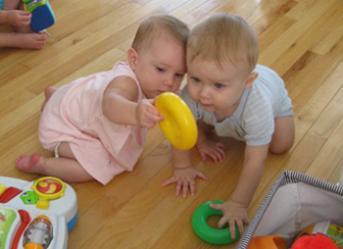eLearning
Deaf-Blindness for Early Intervention Practitioners
VA’s Integrated Training Collaborative | Partnership for People with Disabilities at VCU
This course offers Early Intervention providers with content that focuses on (1) the identification of infants and toddlers with combined vision and hearing loss (deaf-blindness), (2) key instructional strategies, and (3) developmental domains. The selection of resources was guided by the Council of Exceptional Children’s Division for Early Childhood (DEC) Recommended Practices. Time to complete: 1 hour
Virginia’s Part C Early Intervention Vision Screening Process (external website)
Dept. for the Blind and Visually Impaired (DBVI)
This 5 part training series has been developed by the Department for the Blind and Vision Impaired to help identify possible vision problems (Parts 1 & 2) and to clarify the suggested methods in Virginia's Early Intervention Vision Screening process (Parts 3, 4 & 5). Use this training package to learn or review at your own pace.
Presentations
Early Intervention and the Importance of Vision: Visual Development and Assessment of Vision in Infants and Small Children
Linda Lawrence, MD
CVI Scotland
US Pediatric Ophthalmologist Dr. Linda Lawrence gives a talk to empower parents to seek as much information as possible when it comes to understanding their child's vision, especially with very young pre-verbal children and complex non-verbal children. This presentation is also useful for early interventionists and others seeking information about visual development and assessment.
Webinars
Visual Behaviors and Red Flags: An Overview of Cortical Visual Impairment and Considerations for Making an Accurate Diagnosis
VA’s Integrated Training Collaborative | Partnership for People with Disabilities
Presented by Julie Duranda, Ed.D. and Dawn Hendricks, Ph.D.
Cortical visual impairment (CVI) occurs when there is damage to the visual cortex rather than the eye. It may occur in children who have had asphyxia, hydrocephalus, trauma, mitochondrial disorder, infection, and a variety of other causes. The visual behaviors of children with CVI, such as light gazing, looking away when reaching for an object, looking away from faces, and visual inattention are sometimes confused as off-task behavior, disinterest, or red flags for autism. During this webinar, you will get an overview of behaviors of cortical visual impairment that tend to present similar to characteristics of Autism Spectrum Disorders, discuss items on ASD screening tools that may need special consideration for children with CVI, and offer three basic strategies for working with young children with CVI. Click the link above to visit the 2017 Talks on Tuesdays Archive and scroll down until you find the webinars.
Visual Impairments and the Effect on Development
VA’s Integrated Training Collaborative | Partnership for People with Disabilities
Presented by Lisa Auwarter
This webinar provides an overview of visual impairments in infants and toddlers, the effects of visual impairment on development, and strategies to support development. Click the link above to visit the 2013 Talks on Tuesdays Archive and scroll down until you find the webinar.
